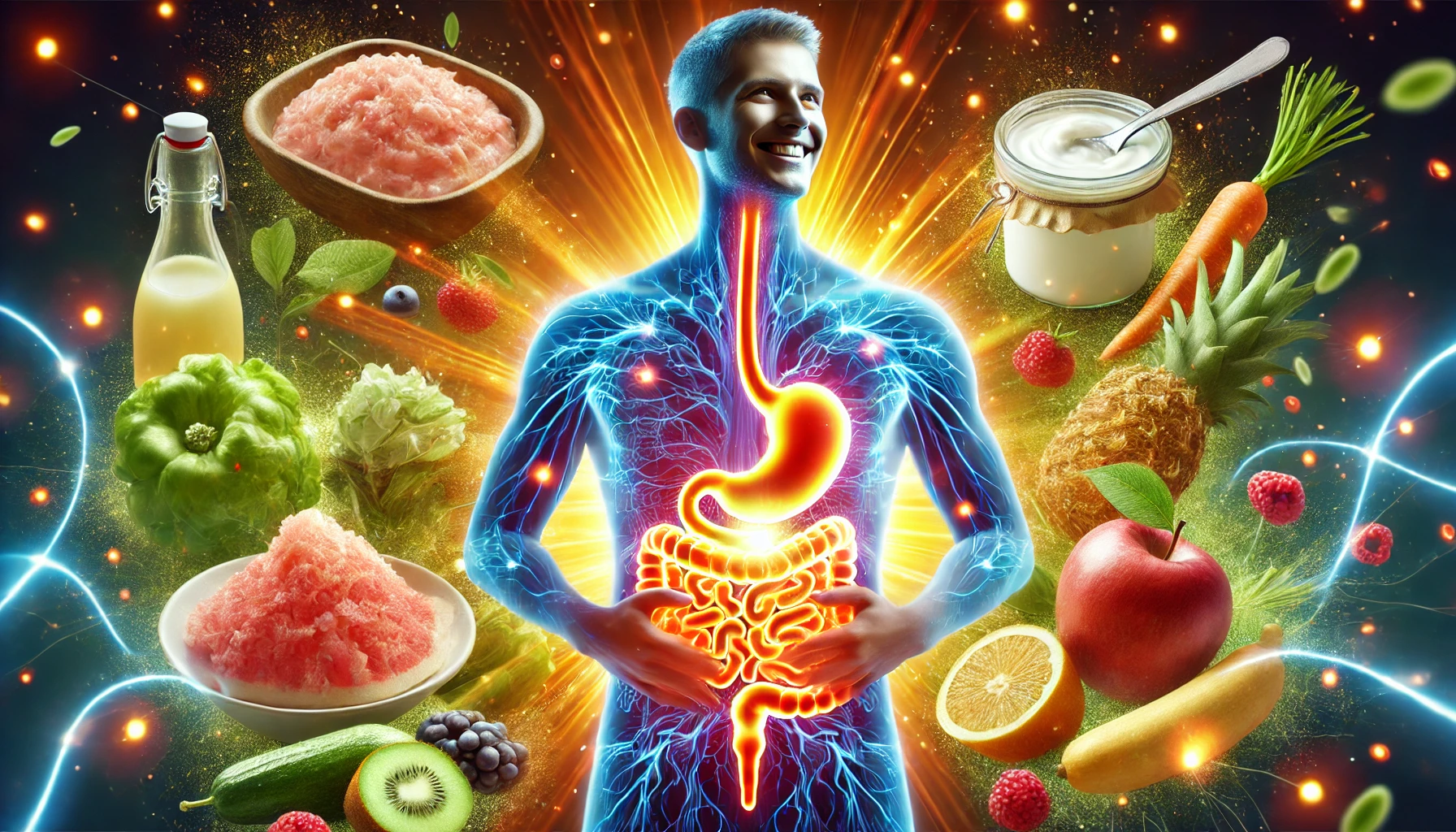[Conteúdo Traduzido para Português – Tom Informal]
Your gut is more than just a digestive system—it’s connected to immune function, brain health, and overall well-being. A healthy gut helps prevent inflammation, digestive disorders, and even mental health issues.
In this article, we’ll explore why gut health matters and how to improve it naturally through diet, lifestyle, and habits.
1. Why Gut Health Matters
The gut is home to trillions of bacteria, known as the gut microbiome, which plays a key role in:
🛡 Boosting immunity – 70% of the immune system is in the gut.
🧠 Supporting brain function – Gut bacteria produce neurotransmitters like serotonin.
🔥 Reducing inflammation – A balanced gut prevents chronic diseases.
🍽 Aiding digestion – Good bacteria help break down food and absorb nutrients.
Tip: A diverse and balanced gut microbiome leads to better digestion, energy, and mood.
2. Eat More Probiotic-Rich Foods
Probiotics are live beneficial bacteria that improve gut health.
Best Probiotic Foods:
🥛 Yogurt and kefir – Natural sources of live bacteria.
🥬 Fermented vegetables (kimchi, sauerkraut) – Promote gut diversity.
🍵 Kombucha and miso – Support digestion and immunity.
Tip: Include at least one probiotic food daily for a healthier gut.
3. Increase Prebiotics in Your Diet
Prebiotics are fiber-rich foods that feed good bacteria in your gut.
Best Prebiotic Foods:
🍌 Bananas – Feed healthy gut bacteria.
🥕 Onions and garlic – Contain natural prebiotic fibers.
🥑 Asparagus and artichokes – Promote gut-friendly bacteria growth.
Tip: Probiotics need prebiotics to thrive, so combine them for better gut health.
4. Reduce Processed Foods and Sugar
Unhealthy foods damage gut bacteria and cause inflammation.
Foods That Harm Gut Health:
🚫 Refined sugar and artificial sweeteners – Disrupt gut bacteria balance.
🍟 Fried and processed foods – Contain harmful fats and preservatives.
🍔 Excess red and processed meats – Can increase gut inflammation.
Tip: Focus on whole, nutrient-dense foods to nourish your gut.
5. Stay Hydrated for Better Digestion
Water helps keep digestion smooth and supports beneficial gut bacteria.
💧 Prevents constipation and bloating.
🦠 Supports the balance of gut microbiota.
🌊 Helps flush out toxins and waste.
Tip: Drink at least 2 liters of water daily to support gut health.
6. Manage Stress to Protect Your Gut
Stress negatively affects gut bacteria and can lead to digestive problems.
How to Reduce Stress for a Healthier Gut:
🧘 Practice meditation or deep breathing.
🏃 Exercise regularly to reduce cortisol levels.
😴 Get 7–9 hours of sleep to restore gut function.
Tip: Your gut and brain are connected—taking care of your mind improves digestion.
7. Get Enough Fiber for Healthy Digestion
Fiber feeds good bacteria and keeps digestion smooth.
High-Fiber Foods for Gut Health:
🍎 Fruits and vegetables – Apples, carrots, and berries.
🌾 Whole grains – Oats, quinoa, and brown rice.
🥜 Legumes and nuts – Lentils, almonds, and flaxseeds.
Tip: Eating 30g of fiber per day improves gut health and prevents constipation.
8. Exercise Regularly to Support Gut Function
Physical activity stimulates digestion and promotes a healthier microbiome.
Best Exercises for Gut Health:
🚶 Walking after meals – Aids digestion.
🏋️ Strength training – Reduces gut inflammation.
🧘 Yoga poses – Help relieve bloating and digestive discomfort.
Tip: Aim for 30 minutes of movement daily for better gut function.
9. Get Enough Sleep to Restore Gut Balance
Lack of sleep negatively affects gut bacteria and digestion.
How to Improve Sleep for Gut Health:
🌙 Stick to a consistent sleep schedule.
📵 Avoid screens 1 hour before bedtime.
🌿 Try herbal teas like chamomile to relax.
Tip: Poor sleep leads to gut imbalances and increased cravings for unhealthy foods.
10. Avoid Overuse of Antibiotics
Antibiotics kill both good and bad bacteria, disrupting gut health.
When to Use Antibiotics Wisely:
🩺 Only take them when prescribed by a doctor.
🦠 Restore gut bacteria with probiotics after antibiotic use.
🥗 Eat gut-friendly foods to speed recovery.
Tip: Unnecessary antibiotics can harm gut bacteria for months, so use them wisely.
Final Thoughts
Your gut is the foundation of good health. By eating probiotic and fiber-rich foods, managing stress, staying hydrated, and exercising, you can improve digestion, immunity, and overall well-being.
Start today by adding one gut-friendly habit to your routine, and your body will thank you!

